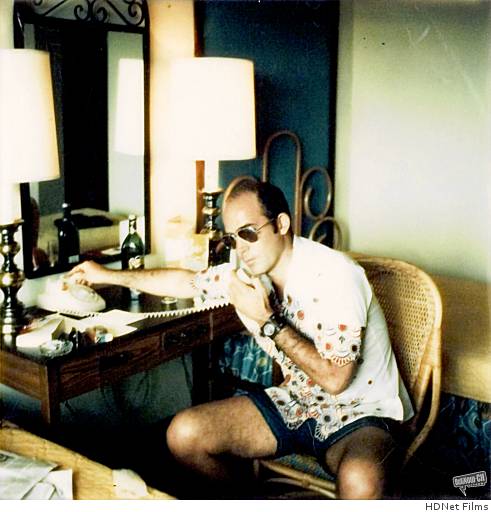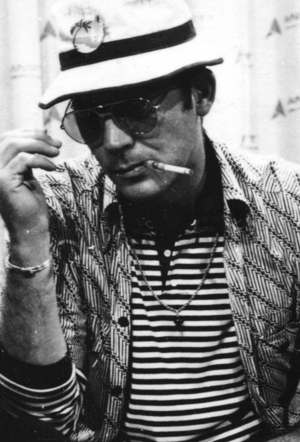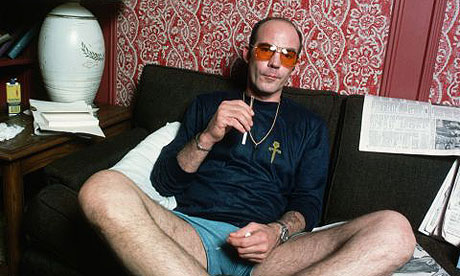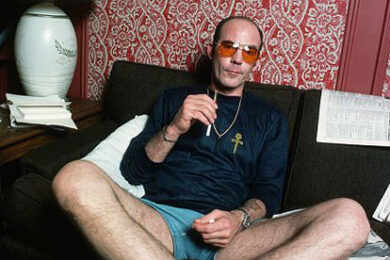I have put off writing this article for too many days now. The reason for this is not laziness, hangovers or ITV’s Fat Teens In Love, but the fact that I am a lifelong fan of Hunter S. Thompson and have no idea how to go about it. Journalists and critics have written their own dictionary, thesaurus and encyclopedia on Thompson. They’ve used up all the superlatives and adjectives in vain attempts to describe the man and his work. Yet, all this has done has rendered phrases such as ‘searing, drug-addled prose’ or ‘acerbic wit’ meaningless and ultimately insufficient, which to be honest, they were in the first place. It’s far too easy to make him sound like an anomaly, a blip on the radar of literature and journalism. I gave up trying to write like him a long time ago and am more than satisfied that I at least get to write about him now. But if I’m finding paying homage to the good Dr. difficult, writer-producer-director Alex Gibney has had no such problem.

Before I lose your interest with self-indulgence and start bathing myself in my own nostalgia, I’ll just come out and say that this film is brilliant. Gibney (Enron: The Smartest Guys in the Room and Taxi to the Dark Side) takes us through Thompson’s life using his various publications as signposts along the way. Not only does it contain interviews and footage with everyone from Sonny Barger, the ex-president of the Hell’s Angels Oakland Chapter, to Jimmy Carter, house builder extraordinaire, but the soundtrack is brilliant, the editing is superb and you are left feeling satisfied that this depiction is as accurate and faithful as anything that could reasonably be produced by a third party – a real definitive portrait.
However, before you start conjuring up the mind’s stock footage of Hunter S. Thompson doing lines off the back of some vulture he’s just hijacked at gun point whilst doing 90 on route 66, I feel a certain responsibility (not to you, to him) to at least mention some of the things that he achieved both as a journalist and as a public figure. Not only did the Doctor command an increasingly dedicated audience through his coverage of the 1972 presidential campaign in which he championed and greatly aided the cause of George McGovern, but Thompson’s dispatches in Rolling Stone supporting Jimmy Carter in 1976 were the most widely read in the whole country. One cannot help but feel the Gonzo hand giving two thumbs up to the younger generation. Thompson understood more than anyone that journalism was not objective and could be used as a political weapon and in his heyday he wielded that weapon expertly.
The film also charts the sad but true realisation that the myth of Gonzo, the rock star persona of Thompson began to take over and ensnare the reality of his personality. The strength of the film is that it really uncovers the man behind the, somewhat self-imposed, image. Everyone tends to forget that Thompson was a staunch patriot who felt that the America he loved and the dream that he believed in had been hijacked. He saw America as a pure ideal that was being eaten away from the inside by men like Nixon. But unlike most of us, he decided to kick against these pricks through his writing, his actions and his lifestyle. Attention is also paid to Thompson’s increasing depression that came about with the election of Bush; a harbinger of doom that makes the T.S. Eliot quote – "Between the Idea and the Reality, falls the Shadow." – at the beginning of Fear and Loathing On The Campaign Trail ’72 all the more relevant:

It is this feeling of impending doom for Thompson, as for most of us watching the film, that evokes an inescapable feeling of melancholy and depression. Of course ironically the recent regime change in America may have offered Thompson a glimmer of hope which would have allowed him to continue offering his insight and sardonic wit to the world. Some may say that this change in the political order would have done little to effect the notably reduced output of quality works in his later career but maybe this was just the inspiration that he needed. Not only does Barack Obama personify the ideals that Thompson saw in McGovern but his skilled use of the media to further his cause and his campaign was a tactic that the good doctor would have been proud of. He would have been happy to see that the monopoly on the mainstream media by the kind of venal individuals he despised had finally been broken.
As soon the film finished I was reviving my youthful dream of someday being just a fraction of the man that he was: to go out and write, live fast and die young. Instead, I hailed a cab. But at least I’m writing now, and I feel privileged to do so, at least partly because Hunter S. Thompson played a part in me wanting to write. I’m grateful now to be reminded of that.



